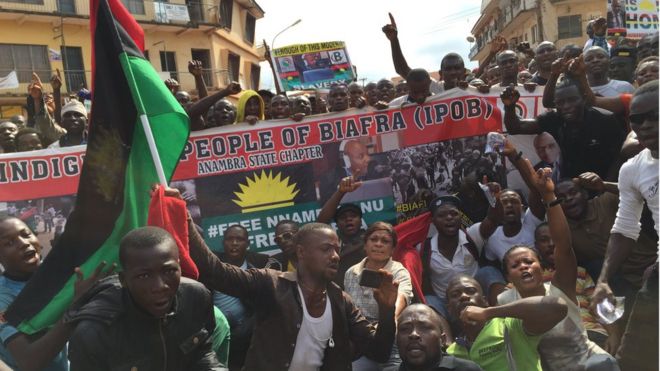Hundreds of people in southern Nigeria have been protesting about the continued detention of Nnamdi Kanu, an activist who supports the creation of a breakaway state of Biafra. The director of Radio Biafra was arrested last month and is still being held despite a court order to free him, his mainly ethnic Igbo supporters say.
The government says his station has been operating without a licence. Biafran secessionists fought a three-year civil war that ended in 1970. More than one million people lost their lives before the uprising was eventually quelled by the military.
Secessionist groups have attracted the support of many young people in the south-east in recent years. The BBC's Abdussalam Ahmed in the southern-eastern city of Enugu says in reality they do not want a repeat of the civil war but are keen to draw the attention of the central government to some developmental challenges the region faces.
The peaceful protests started on Friday in the oil-rich Delta state and has since taken place in five other major cities in the region. The demonstrators are mostly young men holding Biafra flags and banners with pictures of Mr Kanu, who is also a leader in the secessionist Indigenous People of Biafra (IPOB).
Tuesday's march is taking place in the city of Owerri in Imo state a day after the region's biggest market in the city of Aba was reportedly shut down by protesters. A Pro Biafra protester in southern Nigeria on Sunday 8 November, 2015
Nnamdi Kanu has been in the custody of Nigeria's intelligence agency for more than three weeks "We won't give up until our director Nnamdi Kanu is released," one protester told our reporter during a protest in Enugu.
The Biafra activists say a court in the capital, Abuja, ordered the release of Mr Kanu but authorities have refused to comply despite all the conditions set being met. It is not clear where Radio Biafra is based but it mainly broadcasts to the Igbo-speaking south-east of the country.
The Nigerian government began jamming its signals in July but it is still available online and via mobile phones by a dialling a local number, our reporter says. An IPOB leader, Uchemna Madu, told the BBC that the group was fighting against the "injustice and inequality" ethnic Igbos faced in Nigeria.
"We believe in Nigeria, we have businesses everywhere in the country but we are getting nothing apart from political and social marginalisation," he said. "Our lives and properties are not secured, we want to live on our own." The Nigerian authorities have always maintained that most of the issues the Biafra activists are complaining about are not unique to southern part of the country. Culled From; The BBC

Comments
Post a Comment